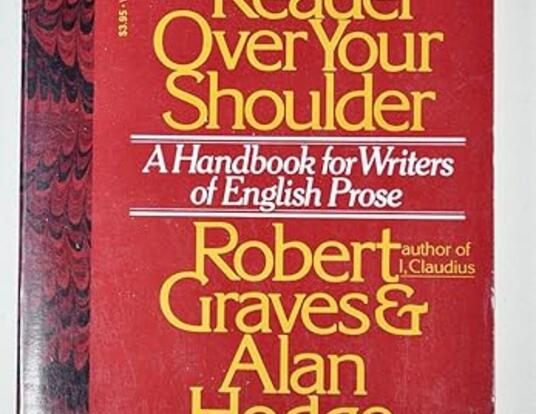Clear as a Bell: Clarity and Metaphor
Notes from a Writer's Desk

There is an old axiom that it is a mark of expertise to be able to explain complex ideas in a simple manner. This is often true, especially when speaking with a non-expert audience. Even among specialists, though, there is something to be said for simplicity’s cousin, clarity. There seems to me to be a definite connection between clarity in thought and clarity in writing. Recently I have been thinking about one common rhetorical device, metaphor, and how it can either bring language to life with sizzling clarity or bury it in the mud of opacity.
Perhaps unsurprisingly given the topic, the writing of George Orwell lurks, crocodilian, beneath the surface of this post. To prevent any undue fears or enthusiasms, I will say up front that neither 1984 nor politics feature here. I instead focus on an essay that I admire for its confidence, clarity, and longstanding ability to make me think more carefully about the choices I make in writing: “Politics and the English Language.” (Again, emphasis on the second half.)
In this essay, Orwell is concerned with clarity of thought and expression.
The entire essay is worth a read, a reminder that writing is hard work that we ought to do thoughtfully. I don’t agree with every point—the preference for Anglo-Saxon words seems a bit antiquated, for example—but generally Orwell offers good advice in what to do and, importantly, what to avoid.
He excuses literary works from criticism, where clarity is perhaps not the chief goal. Scientific, political, and academic writing, however, are all fair game for his ire, as are dead metaphors like fair game, so stripped of context that they do not even register as metaphors. Arguably worse are dying metaphors, suspended between the living and the dead: not fresh enough to evoke a vivid image in the reader’s mind, but not yet entirely devoid of energy (ride roughshod over, for example). The problem lies not in metaphor per se—Orwell welcomes fresh, evocative ones—but rather in what it represents. He argues that imprecise, insufficiently deliberate language is a mask for imprecise thinking, even when dressed up in literary, erudite, or technical prose.
To put it differently: the use of set phrases, dead or dying metaphors, jargon, the passive voice, and other such tools relieves the writer of saying precisely what they mean. It may even relieve the writer of having to say, think, or mean anything at all. I worry that he is right.
Think of often-caricatured corporate jargon: let’s circle back to that idea, take the 10,000-foot view, and rethink our decision vectors. There are times when we may mean each of these things (though someone will have to explain decision vectors to me), but it is also the kind of sentence one could say just to be saying something, rather than to advance a view or move a conversation forward. It might, ultimately, be meaningless. Academic writing has its share of this too. Finding just the right word or phrase to express what you mean sometimes feels like a bridge too far, and we take shortcuts. I do, at least.
A draft of my own dissertation included one brutally mixed metaphor (long since fixed, thanks to the sharp eye of a dedicated committee member): “The coinage of this era demonstrates that while sharp edges were sanded down in time, the reins were held loosely enough to allow mistakes.” Written no doubt at some dark hour of the night, this sentence is not elegant. Orwell would have had a field day. Note the ease with which I slipped from woodshop onto horseback, sanding edges then holding reins. Both metaphors (certainly dead or dying) are also in the passive voice, even though it probably matters to my scholarship who was doing these things.
Every dissertation and piece of writing has infelicities, and I don’t think mine was especially bad in its ideas or execution. The point is simply that the sentence above is not clear thinking or clear writing. It is a vague gesture at ideas, as if I did not want readers to examine them too closely—and probably I didn’t. I hid behind metaphor.
Orwell reminds us to say what we mean. To do so, however, requires first deciding with at least a modicum of courage what precisely we mean, then finding the words that express those ideas. The other option is the piling up of a comfortable approximation of thought from the spare-parts bin of prose. That’s what led me to sanding edges on horseback.
The good news is that the very act of writing can do double duty, forcing you to clarify your ideas in order to get them down on page or screen. We would probably all do well to heed his suggestion to write and edit with a focus on clarity in words and meaning. Not to do so would be a real swing and a miss—er, I mean, a disservice to the intellectual labor that underpins your work. That deserves some thought.
Banner Image: Winslow Homer, Sailboat and Fourth of July Fireworks, watercolor and white gouache on white wove paper, 1880. Harvard Art Museum/Fogg Museum, Bequest of Grenville L. Winthrop, 1943.
Ready to book an appointment with FWC staff? Access the FWC intake form.
Get the Latest Updates
Join Our Newsletter
Subscribe to Colloquy Podcast
Simplecast




